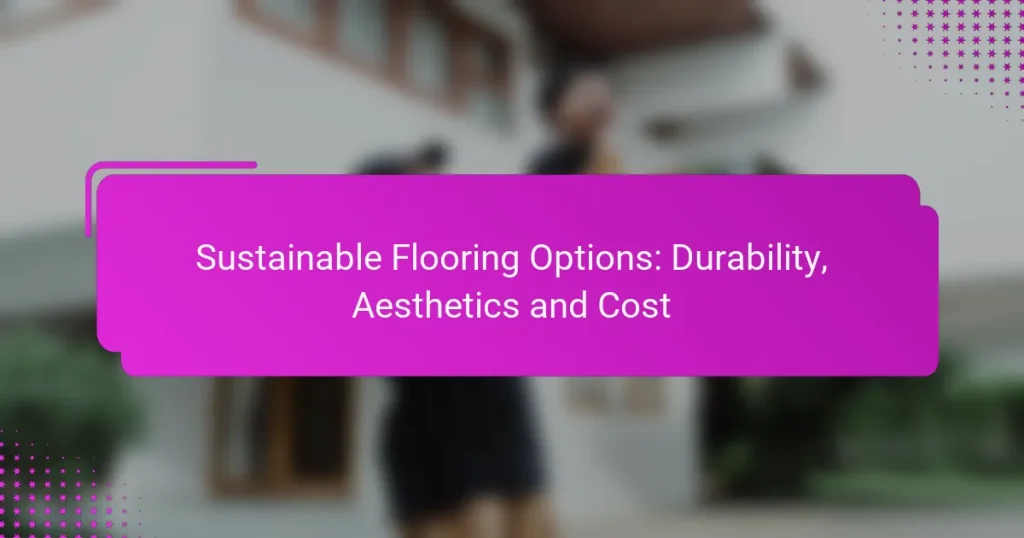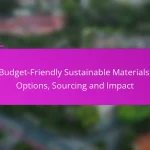Choosing sustainable flooring options like bamboo, cork, and reclaimed hardwood can significantly enhance your home while being environmentally responsible. These materials not only provide durability and aesthetic appeal but also come at a cost-effective price point. By selecting sustainable flooring, you can enjoy a stylish interior that minimizes your ecological footprint.

What are the best sustainable flooring options in the US?
The best sustainable flooring options in the US include bamboo, cork, reclaimed hardwood, luxury vinyl tile (LVT), and linoleum. These materials offer a balance of durability, aesthetic appeal, and cost-effectiveness while minimizing environmental impact.
Bamboo flooring
Bamboo flooring is a rapidly renewable resource that can be harvested every three to five years. It is known for its strength and durability, making it suitable for high-traffic areas. However, ensure that the bamboo is sourced from sustainable forests to avoid contributing to deforestation.
When considering bamboo, look for products with a high-quality finish to enhance longevity and resistance to scratches. Prices typically range from $3 to $8 per square foot, depending on the quality and brand.
Cork flooring
Cork flooring is made from the bark of cork oak trees, which regenerate after harvesting, making it an eco-friendly choice. It offers excellent insulation and sound absorption, making it ideal for homes where noise reduction is a priority.
While cork is durable, it can be susceptible to moisture, so it’s best used in dry areas. Expect to pay between $4 and $10 per square foot for cork flooring, depending on the style and finish.
Reclaimed hardwood
Reclaimed hardwood is sourced from old buildings, barns, or other structures, giving new life to wood that would otherwise be discarded. This option not only reduces waste but also adds unique character to a space.
When selecting reclaimed hardwood, check for proper treatment to avoid pests and ensure durability. Prices can vary widely, typically ranging from $5 to $15 per square foot, influenced by the wood type and finish.
Luxury vinyl tile (LVT)
Luxury vinyl tile (LVT) mimics the appearance of natural materials like wood or stone while offering enhanced durability and water resistance. It is a popular choice for both residential and commercial spaces due to its versatility and ease of maintenance.
LVT is available in a variety of styles and can be installed as a floating floor or glued down. Prices generally range from $2 to $7 per square foot, making it an affordable option for many homeowners.
Linoleum
Linoleum is made from natural materials such as linseed oil, cork dust, and wood flour, making it biodegradable and a sustainable choice. It is known for its durability and can last up to 40 years with proper care.
This flooring option comes in a range of colors and patterns, allowing for creative design choices. Linoleum typically costs between $3 and $6 per square foot, making it a cost-effective solution for eco-conscious consumers.
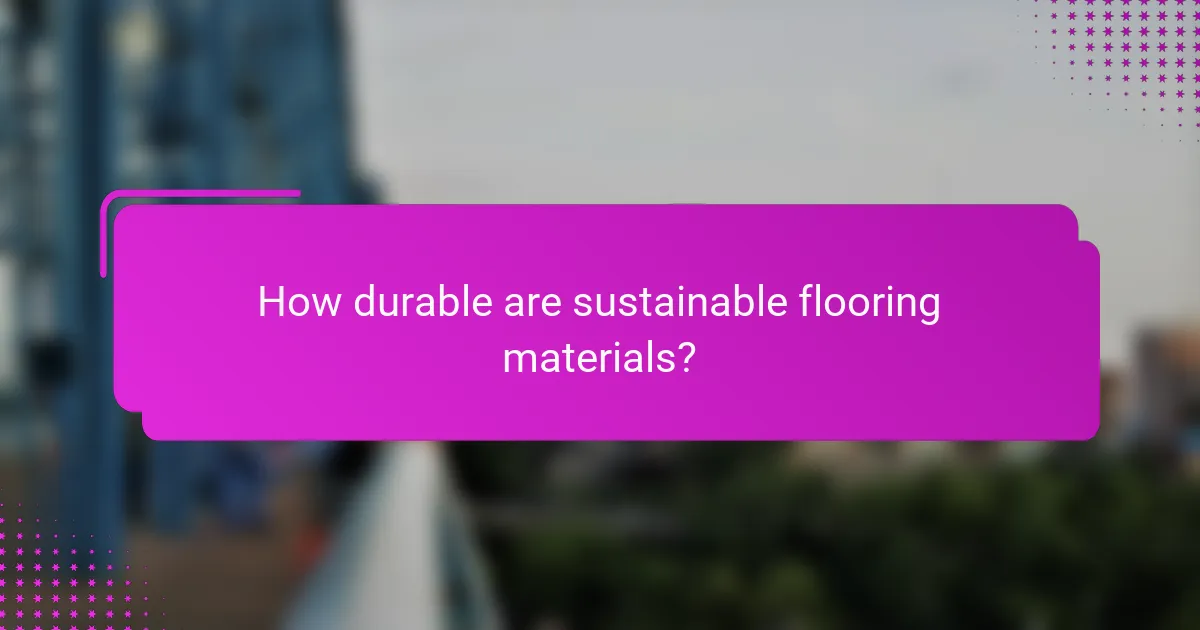
How durable are sustainable flooring materials?
Sustainable flooring materials are generally quite durable, often designed to withstand heavy foot traffic and resist wear over time. Their longevity can vary based on the specific material and its intended use, but many options provide excellent performance when properly maintained.
Bamboo durability ratings
Bamboo flooring is known for its strength and resilience, often rated higher than traditional hardwoods. It typically has a Janka hardness rating ranging from 1,300 to 1,500, making it suitable for residential and light commercial use. However, the quality can vary significantly based on the manufacturing process and the type of bamboo used.
Cork resistance to wear
Cork flooring offers good resistance to wear and tear, thanks to its natural properties. It has a Janka hardness rating of around 200 to 400, which makes it softer than many hardwoods but still durable enough for residential spaces. Its unique cellular structure also provides cushioning, making it comfortable underfoot and resistant to impact damage.
Reclaimed hardwood lifespan
Reclaimed hardwood can have an exceptionally long lifespan, often exceeding 100 years if properly maintained. This durability stems from the fact that old-growth trees used for reclaimed wood were typically denser and harder than many modern alternatives. Regular refinishing can help preserve its appearance and integrity over time.
Luxury vinyl tile durability
Luxury vinyl tile (LVT) is highly durable, often designed to withstand heavy foot traffic and resist scratches and stains. Most LVT products have a wear layer thickness of 20 to 30 mils, providing excellent protection. Additionally, LVT is water-resistant, making it suitable for moisture-prone areas like kitchens and bathrooms.

What are the aesthetic benefits of sustainable flooring?
Sustainable flooring offers a range of aesthetic benefits, including unique designs, natural textures, and a variety of colors that enhance interior spaces. These materials not only contribute to a stylish look but also promote environmental responsibility.
Design versatility of bamboo
Bamboo flooring is known for its remarkable design versatility, making it suitable for various interior styles, from modern to traditional. Its natural grain patterns and colors can complement a wide range of decor, allowing homeowners to create a cohesive look.
Additionally, bamboo can be engineered into different formats, such as planks or tiles, providing options for unique layouts. Its ability to be stained or finished in various shades further enhances its adaptability.
Color options in cork
Cork flooring presents an array of color options, ranging from natural earthy tones to vibrant hues. This variety allows homeowners to select flooring that aligns with their personal style and the overall aesthetic of their space.
Moreover, cork can be printed or stained to mimic other materials, such as wood or stone, providing the look of luxury without the environmental impact. This flexibility makes cork an appealing choice for both residential and commercial applications.
Visual appeal of reclaimed hardwood
Reclaimed hardwood flooring offers a unique visual appeal, characterized by its rich history and distinctive imperfections. Each plank tells a story, adding character and warmth to any room.
The variety of finishes available, from rustic to polished, allows reclaimed wood to fit seamlessly into diverse design schemes. Its natural beauty and sustainability make it a popular choice among eco-conscious homeowners.
Luxury vinyl tile design trends
Luxury vinyl tile (LVT) has gained popularity for its ability to mimic high-end materials like stone and hardwood while offering superior durability. Current design trends include realistic textures and patterns that enhance the visual experience.
Additionally, LVT is available in a wide range of colors and styles, making it easy to find a perfect match for any decor. Its water resistance and ease of maintenance further contribute to its appeal in both residential and commercial settings.
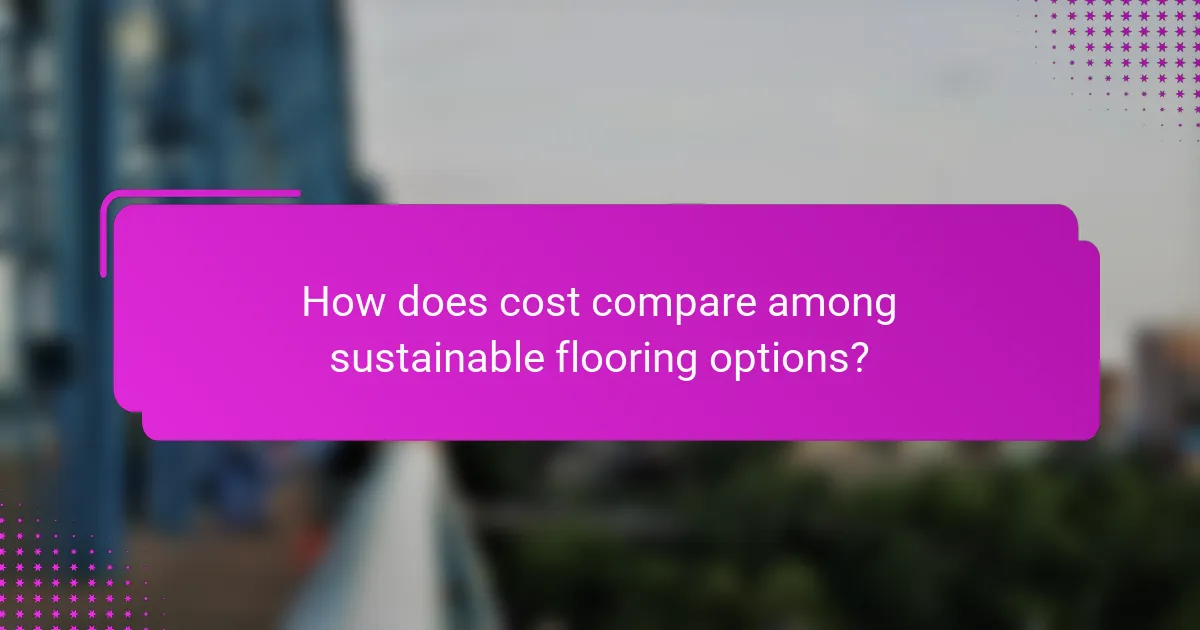
How does cost compare among sustainable flooring options?
The cost of sustainable flooring options varies significantly based on materials, installation, and regional pricing. Generally, prices can range from moderate to high, depending on the type of flooring and its durability features.
Bamboo pricing overview
Bamboo flooring typically costs between $3 to $8 per square foot, making it a competitively priced option among sustainable materials. The price can fluctuate based on the quality, thickness, and finish of the bamboo. Installation costs may add an additional $2 to $5 per square foot.
When considering bamboo, look for products that are certified by organizations like the Forest Stewardship Council (FSC) to ensure sustainability. Keep in mind that while bamboo is durable, it can be sensitive to moisture, so proper sealing is essential.
Cork flooring cost analysis
Cork flooring generally ranges from $4 to $10 per square foot, depending on the quality and design. Higher-end cork products with advanced finishes can push costs toward the upper end of this range. Installation may add another $3 to $6 per square foot.
Cork is an excellent insulator and is resistant to mold and mildew, making it a practical choice for various climates. However, it can be prone to fading in direct sunlight, so consider using rugs or curtains to protect it.
Reclaimed hardwood pricing
The cost of reclaimed hardwood can vary widely, typically falling between $5 to $15 per square foot. Factors influencing the price include the wood species, age, and the degree of processing required. Installation costs can be similar to those of traditional hardwood, ranging from $3 to $7 per square foot.
Reclaimed hardwood not only adds character to a space but also reduces environmental impact by reusing existing materials. Ensure you verify the source and quality of the wood to avoid issues with durability and maintenance.
Luxury vinyl tile cost comparison
Luxury vinyl tile (LVT) usually ranges from $2 to $7 per square foot, making it one of the more affordable sustainable flooring options. The price can vary based on the design, thickness, and brand. Installation costs typically add another $1 to $3 per square foot.
LVT is known for its durability and water resistance, making it suitable for high-traffic areas and moisture-prone spaces. When selecting LVT, look for products with a high wear layer for better longevity and performance.
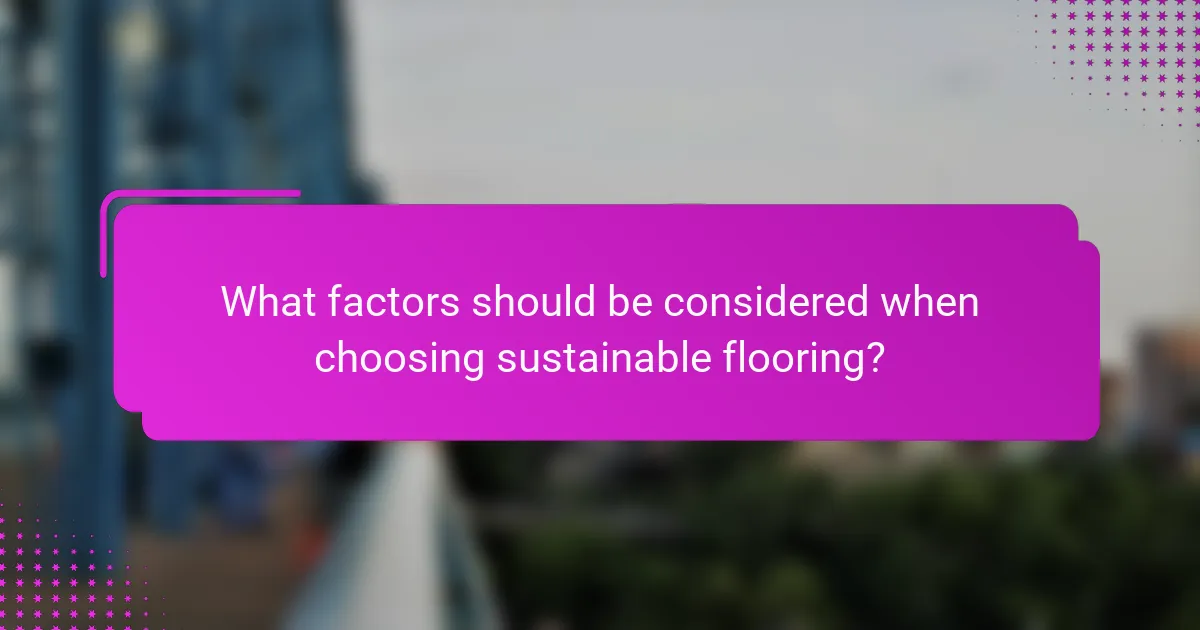
What factors should be considered when choosing sustainable flooring?
When selecting sustainable flooring, consider durability, aesthetics, cost, and environmental impact. These factors will help you choose a flooring option that meets your needs while minimizing ecological harm.
Environmental impact
The environmental impact of flooring materials includes their production, transportation, and disposal. Sustainable flooring options, such as bamboo, cork, and reclaimed wood, typically have a lower carbon footprint compared to traditional materials like hardwood and vinyl.
Look for certifications such as FSC (Forest Stewardship Council) or Cradle to Cradle, which indicate responsible sourcing and manufacturing practices. These certifications can guide you towards options that are not only eco-friendly but also support sustainable forestry and manufacturing processes.
Additionally, consider the lifecycle of the flooring. Materials that are biodegradable or recyclable at the end of their life can significantly reduce waste. Opting for local materials can also minimize transportation emissions, making your flooring choice even more sustainable.
